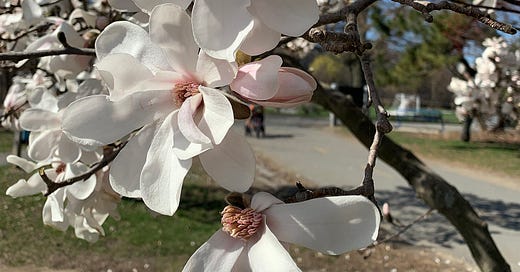
The French are now into the first week of their third lockdown. Suffering from high new case counts, and with only 16% of the population protected by at least one vaccine dose, it must be demoralizing to have three weeks left of restrictions, even though this time it’s called “lockdown light.”
In Paris at this time last year, we were three weeks into France’s first lockdown. Optimism for an abbreviated pandemic hung in the fresh spring air. It was beyond imagining that the virus would still be raging over a year later.
In those days, that optimism rang out at 8pm every night, when Parisians stood at their open windows or on their balconies to applaud in thanks to the caregivers — those compassionate doctors, nurses, and support team members in hospitals — struggling behind inadequate protective gear to save their patients from a still mysterious disease.
As we stood clapping on our sixth floor* balcony, one balmy spring evening after the next, we often saw a young couple clapping and waving on the roof of the apartment building across from us, half a city block away. We have seen top-floor apartments with roof access, so we could easily imagine how they had scrambled up an ancient wooden ladder to emerge through a trapdoor. They seemed so at ease up there, feet planted on the gentle slope of the zinc roof, applauding, arms reaching for the pink blue sky. She had the shape of a model; he was barely her height, but every bit as trim.
We were separated first by our little street — the French call it a passage — then by a three-story building that surrounds a courtyard, and then by another small street, rue Amélie. We could not make out their faces. They were silhouettes against the sunset sky — a Rorschach test for a pandemic time, blots that looked like the fullness of life.
The first time we saw them, with the young woman’s encouragement, we tried to introduce ourselves across that Parisian abyss, but I never did really get their names. On most nights at 8:00 they were there on the roof, so we would exchange a few words after the clapping stopped. Modulated by such a social distance, the French syllables strained my language skills, so I often had to ask Isabelle to translate.
On our tiny street, participation in the “Thank You” applause was, I have to say, less than universal. When the rooftop couple did not show up, we felt like the sound of our clapping had nowhere to go.
“Where could they be?” we whined, feeling abandoned.
When restrictions were lifted in the middle of May, our rooftop friends seemed unsurprised to hear we had plans to get out of town. City life had grown old under lockdown. We headed for the Montparnasse train station, destination Brittany. We finally returned to Paris in early October, and had hardly been in the apartment a day when Isabelle said I should look across the way. It seemed someone was waving at us.
Puzzled, I scanned the windows of the apartment building, the same one, on rue Amélie, where the young couple had cheered us up from their rooftop perch. This time they were in their apartment, opening a window, standing behind a black ironwork railing. We rushed out onto our balcony. Now there was ambient light on their faces, but we could still not make them out.
“We’re moving away!” they hollered. Isabelle and I had returned to Paris just in time for them to bid us adieu. No need to string any more news than that across the low-lying building between us. We wished them well, and gave a good wave. As I turned to go inside, I turned to look back, and they saw me, and we waved again.
If it had not been for the lockdown, the architecture of Parisian rooftops, and that young couple’s generosity, we never would have had that experience. A friendship at its most elemental. No names. Not even any recognizable faces.
This past Thursday, we took the “T” subway into Boston’s hospital district to get our second dose of the Pfizer-BioNTech vaccine. I asked the nurse who administered my shot — her name is Maria — how many milliliters are in an injection. Through her mask came the answer: 0.3ml.
I could offer up only a “Wow!” in response.
She said yes, it’s amazing how so little can do so much.
Thanks, Maria. And thanks to the couple on the roof.
———————
* I’m using American nomenclature here. In France they call our level the fifth floor, because the street level floor is numbered “zero.”
———————
Free sign-up at joekelley.substack.com
[Photos by JK unless otherwise noted.]



This chapter is among the most special in its evocation of that highly keyed Covid nostalgia. JK vividly recalls his & Isabelle's almost imaginary friendship with another couple who joins in the nightly applause of the efforts of the indispensable medical staff across Paris. But they can barely make out the details of the friends through the intervening streets that separate them and they can only shout at each other. And yet JK finds they have considerable emotion invested in the fleeting association. What a perfect Covid trope!